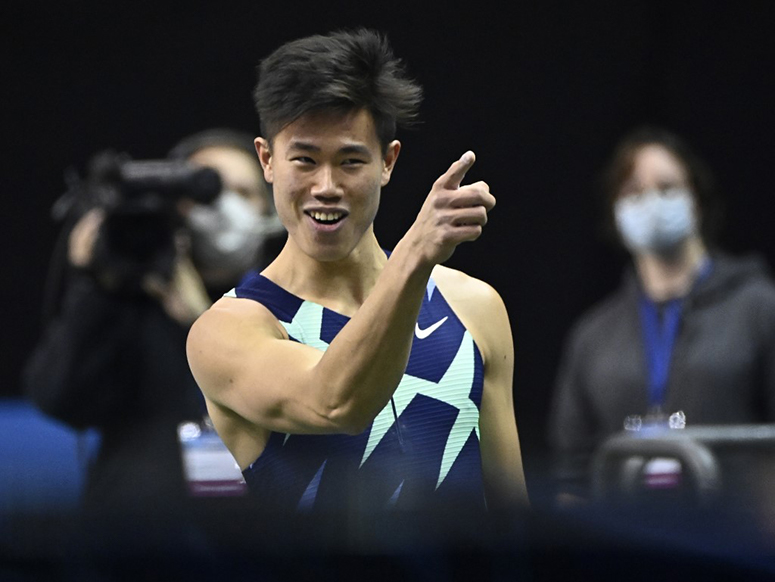It takes a village to win an Olympic gold medal
There is an old African proverb most of us have heard: “It takes a village.”
While this proverb originally applied to the raising of good children, it can be applied to any worthwhile and long-term endeavor in life. And it certainly can apply to winning an Olympic gold medal. I know, because I have been spending years in the pursuit of this goal.
My “village” is like any village. It’s a collection of people who are invaluable to the challenge of winning gold. And, as the aspirations have grown, and the challenges have become greater, it has necessitated expanding the boundaries of my “village.”
Let me explain.
My village started with my mother and father. They raised me; they supported my dreams from early on. They sacrificed for me so I could have a chance. They did everything right and they did it all for me. I owe them a debt I could never, ever repay. Thank you, Mom and Dad!

As I grew, and became a legitimate athlete, my village had to extend its boundaries. In came the Philippine Sports Commission (PSC), representing Filipino taxpayers, who stood behind me and supported me when nobody else would. They funded the pole vault venues I competed in. They bought my equipment. They funded my travel and national competitions. They fed my desire to win for my country.
I owe PSC and, as a byproduct, all Filipino taxpayers, a debt of gratitude I can never fully repay. Thank you!
Sports, especially Olympic sports, are big business. Many countries look to Olympic competition as a form of nation-building, to put their nation on the map and to build national pride.
I eventually became a national athlete. And my village by necessity had to expand further. It now included my national sports federation, the Philippine Athletics Track and Field Association (PATAFA) and specifically Dr. Philip Ella Juico. Dr. Juico stood up for me and enabled me to be sponsored by the World Athletics Federation to live and train with the best coach in the world, Vitaly Petrov, in Italy.
When I tore the ACL (anterior cruciate ligament) in my knee in preparation for the 2017 SEA Games, and most thought my career was over, at the hospital were only five people: my parents; my mentors, James and Carol Lafferty; and Dr. Juico. He stood by me over the years and threw his support to help me get chances to prove myself. I can never repay the debt of gratitude I have to PATAFA and Dr. Juico. Thank you, Sir Juico and PATAFA!
One can be forgiven at this point for thinking this village is big enough. But unfortunately, when it comes to Olympic gold medals, it is not.
Sports, especially Olympic sports, are big business. Many countries look to Olympic competition as a form of nation-building, to put their nation on the map and to build national pride. It takes global mobility and the dedicated support of a team of professionals — not only coaches but also nutritionists, sports psychologists, kinesiologists, strength coaches, and so on, to be competitive.
You can’t just show up every four years at the Olympics, wide-eyed and full of awe, and expect to beat the best. You have to know your competition. Compete with them day after day. Raise your own standards.
In my sport of track and field, there exists a simple fact: Every single medal winner in the Olympics competes in the prestigious “Diamond League” in Europe. Everyone. This is where the best go and compete. And if you want to beat the best, you must train with the best and go head-to-head with the best regularly.
You can’t just show up every four years at the Olympics, wide-eyed and full of awe, and expect to beat the best. You have to know your competition. Compete with them day after day. Raise your own standards.
This takes huge sums of money. You must live in Europe. Train in Europe. Travel across Europe. Fly to every major city. You must stay in European-priced hotels. Ship your poles. Pay for your coach to travel with you. It adds up, trust me!
Its added cost goes far beyond a typical national athlete. But this is the price to pay if you want to win. Going to the Olympics is one thing; winning is a whole other matter. I am going to Tokyo to win. I am not going just to say, “I made it.” I demand more of myself.
To make this happen, I have had to expand my village to include the private sector. Sponsors. Companies who want me to endorse their products. And frankly, I think, as a man who loves his country and is deeply appreciative of the village, this is the responsible thing to do.
I don’t believe I should be asking my brothers and sisters, the Filipino taxpayers, to pay every single expense of this huge bill. I know how tough things are in my nation with the COVID impact. I know there are more needs than budgets.
I am satisfied with the committed funds PSC and PATAFA give me for my training. If I need to go beyond this — and I do — I think to be a responsible citizen I should engage the private sector. I should not go back and demand more of the Filipino taxpayer. They support me enough. I am a big boy, and I can help myself. I will engage the private sector.
That completes my village and puts me in a position to do my best and to hopefully bring home a medal for my country. I thank my entire village. I need my entire village. And I ask that nobody becomes angry or upset that my village has expanded. It’s necessary. Don’t ask me to pick between those in my village. I cannot. Because “it takes a village” to win in the Olympics.


